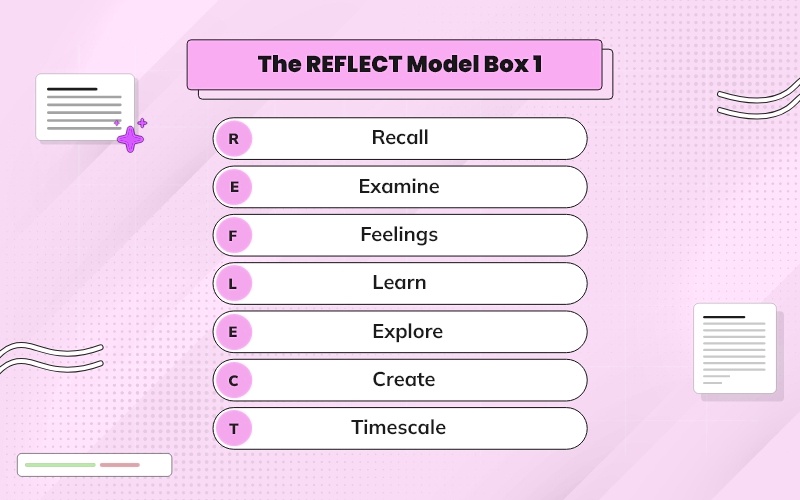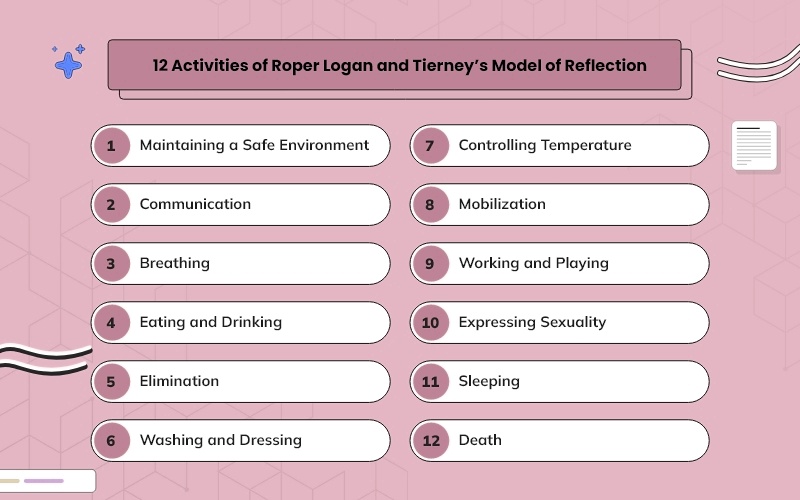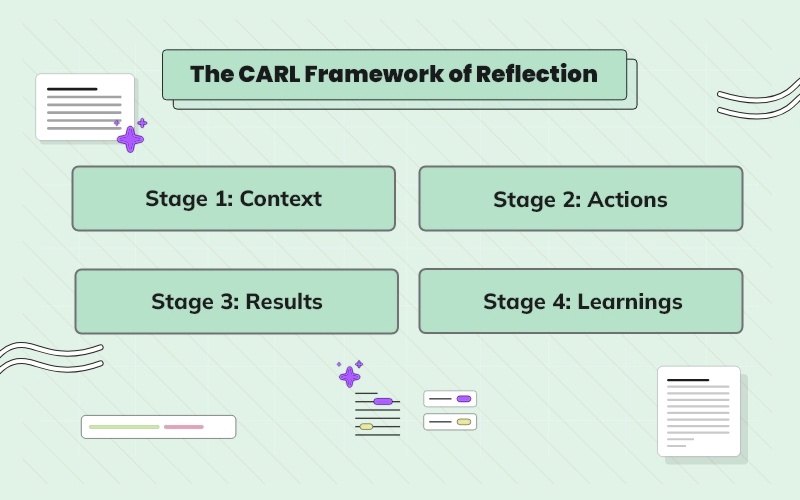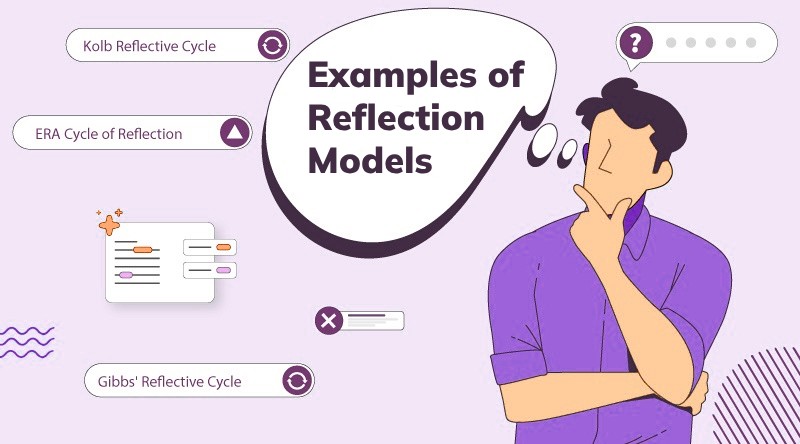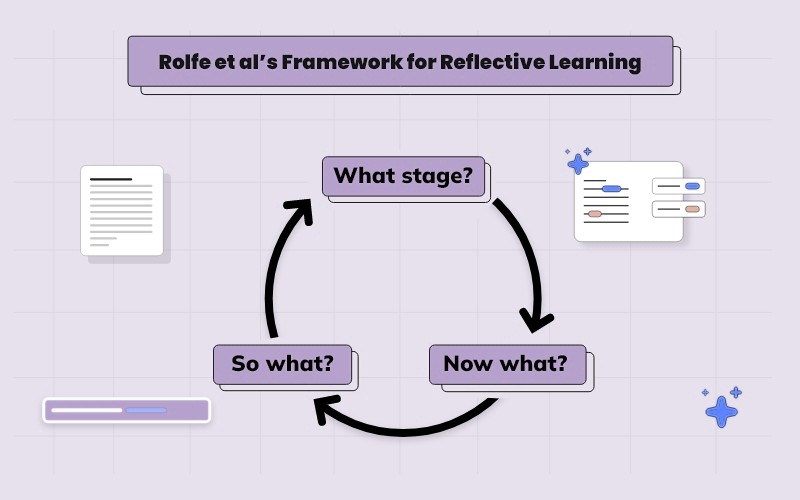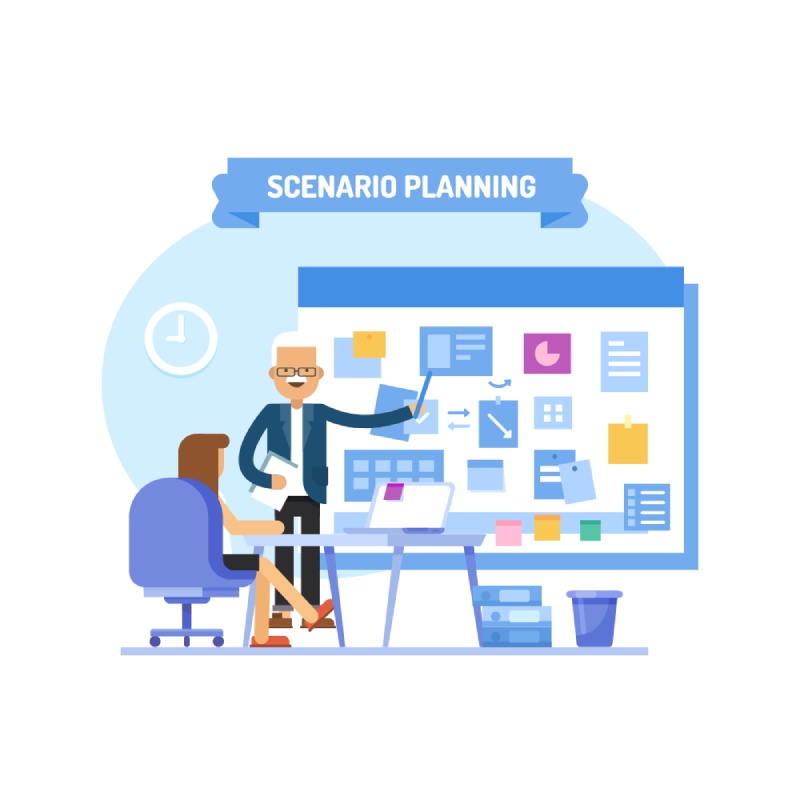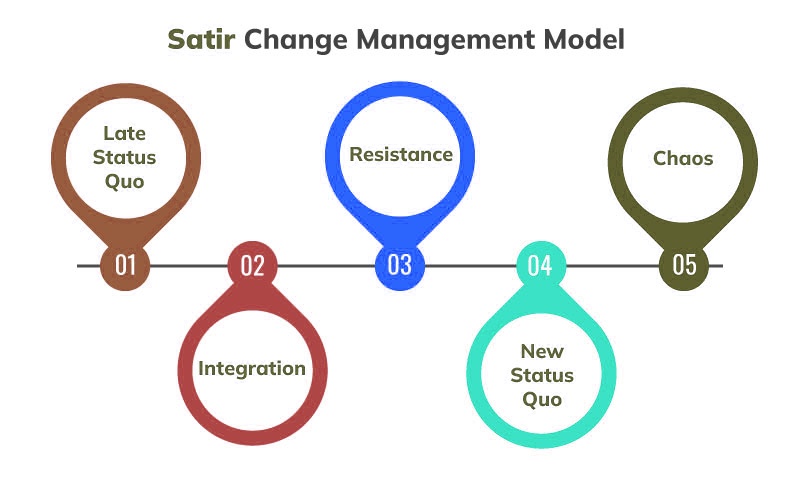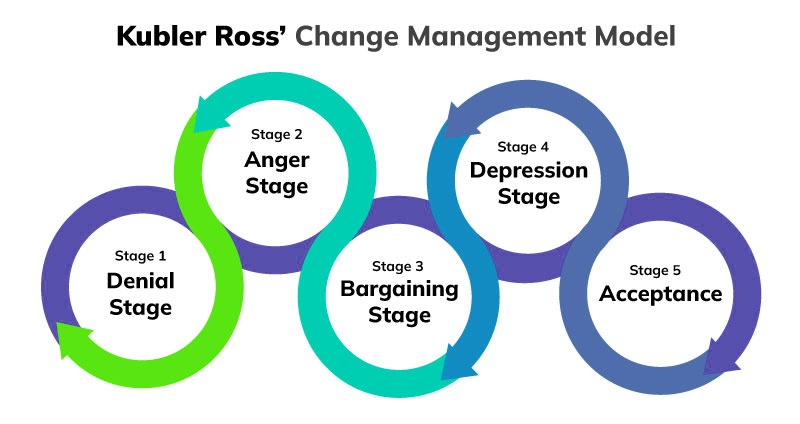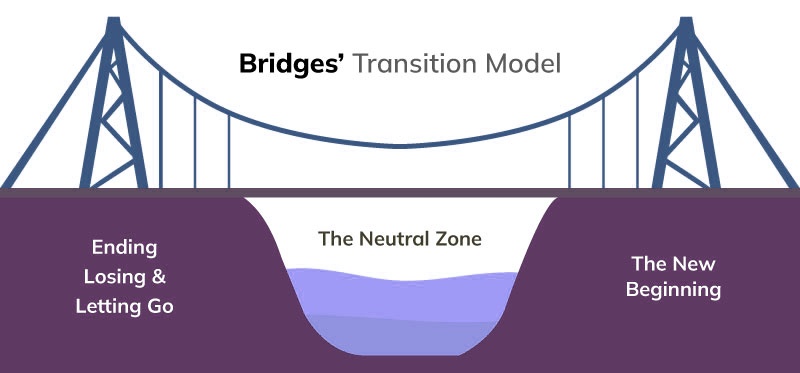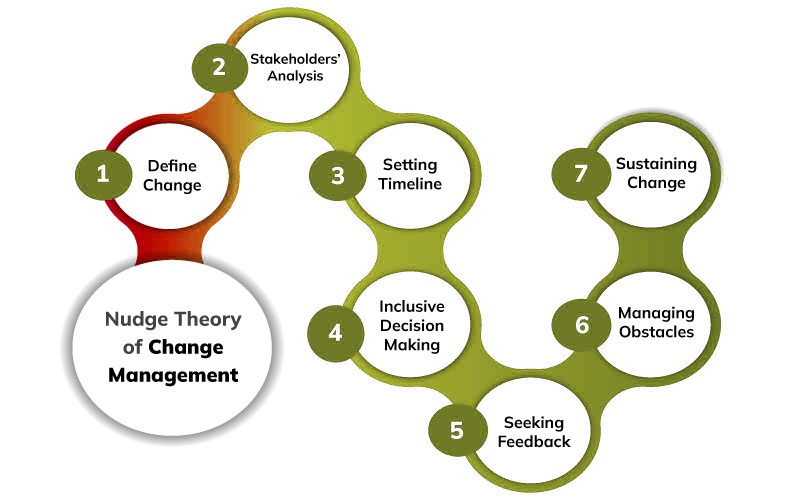Overview
With the intention of creating an easy-to-use and simple reflection model, Nick Butcher and Andy Whysall developed a modified version of Gibbs’ reflective cycle. Butcher and Whysall wanted healthcare individuals to focus on the meaning of the reflection process and what benefits health workers can derive from it. This REFLECT model box 1 is divided into 7 stages
R - Recall
E - Examine
F - Feelings
L - Learn
E - Explore
C - Create
T - Timescale
Seven stages of REFLECT Model Box 1
A detailed elaboration of every stage and the relevant questions that can assist you in understanding the concept effectively are mentioned below.
Stage 1: Recall the event
Recall is the very first and foremost stage of the REFLECT model Box 1 in which you need to give a depth description of the experience you wish to reflect upon. This stage will cover all the factual information that needs to be addressed for relevant reflective writing for self-reflection. At this stage, you are supposed to recall all the contextual situations that lead up to the incident you want to reflect upon. Key questions that can assist you at this stage are
- What was exactly happening?
In this, you will highlight the factual information about the incident making the readers familiar with the overall context of the situation. - When and where did it happen?
While answering this, you will highlight the time and location of the incident you are reflecting upon. - Who was involved and how did they react?
During this, you will highlight the involvement of other characters in the situation and also elaborate on their reaction that contributed to the occurrence of the situation you are reflecting on.
Stage 2: Examine your actions
In the second stage, as the name suggests, you need to examine your response. To simplify, in this stage you will elaborate your response by addressing a situation you want to reflect upon. Alongside this, you will also discuss your thoughts during the occurrence of an incident. A few important questions are
- What was your reaction?
In this, you will highlight the actions that were taken by you in response to the occurrence of the situation. - Why did you react in the way you did?
While answering this, you will focus on the reason behind the reaction you gave in a situation you are reflecting on. - How do other elements influence your reaction?
While answering the question, you will focus on the involvement of other aspects and also state the link between the other elements' involvement and your reaction.
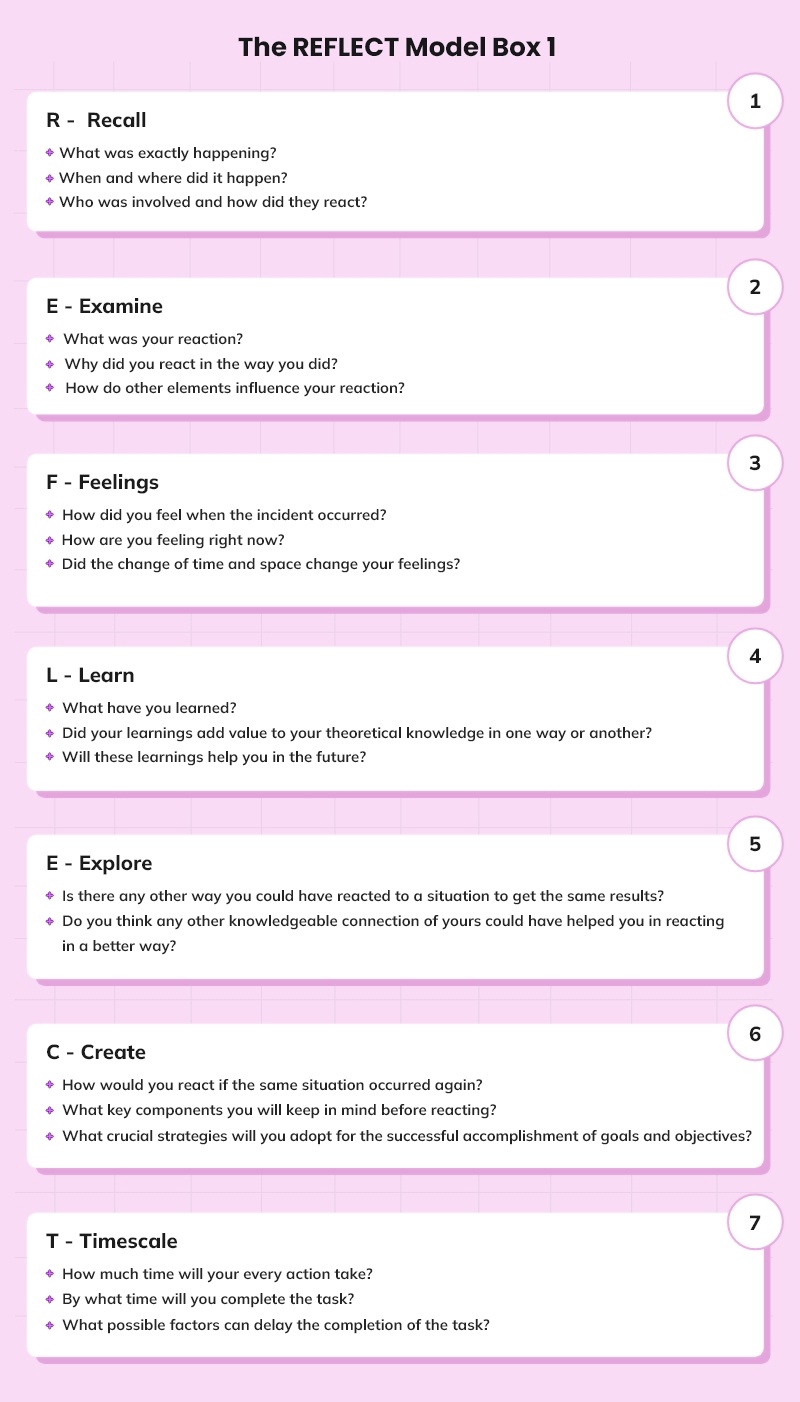
Stage 3: Feelings acknowledgement
In the third stage, you will acknowledge all the feelings you felt at the beginning, during, and by the end of the incident, you are reflecting. This self-actualization of feelings will help you in self-improvement. Some effective questions that can assist you in acknowledging your feelings are
- How did you feel when the incident occurred?
In this, you will highlight your feelings during the occurrence of the event you are reflecting on. - How are you feeling right now?
While answering this question, you will highlight your feelings currently about the situation that has occurred in the past. - Did the change of time and space change your feelings?
Now that you have effectively analyzed your feelings during and after the event, you will highlight the fact that the change of time and space has changed your feelings or not. If yes, then you will elaborate on the difference of feelings between now and then.
Stage 4: Learn through experiences
This is the fourth stage where you are supposed to learn through your experience and draw out all learnings from the situation. Below are some assisting questions that will help you in stage 4 are.
- What have you learned?
In this, you will highlight your overall learnings from the experience. - Did your learnings add value to your theoretical knowledge in one way or another?
In this, you will highlight the value of the experience or the learnings of the experience added to your theoretical knowledge. - Will these learnings help you in the future?
While answering this question, you will highlight the ways in which all your learning is going to help you in the future.
Stage 5: Explore your options
At this stage, you will underline all the possible options that you would consider if similar situations occur in the future again. The questions that will help you in exploring your option are
- Is there any other way you could have reacted to a situation to get the same results?
While answering this question, you will highlight the alternative ways in which you could have reacted and gotten the same results. - Do you think any other knowledgeable connection of yours could have helped you in reacting in a better way?
In this, you will focus on underlining the people who according to you are more knowledgeable and he/she could have helped you in reacting better.
Stage 6: Create your action plan
This stage will assist you in creating a whole action plan for situations. Additionally, all information regarding the important strategies that you will adopt to tackle future similar situations will also be mentioned in this section of the framework. Some assisting questions are
- How would you react if the same situation occurred again?
While answering this question, you will highlight actions you would take for future similar situations. - What key components will you keep in mind before reacting?
In this, you will highlight the other major components or key considerations that you will keep in mind for reacting in future situations. - What crucial strategies will you adopt for the successful accomplishment of goals and objectives?
In this section, you will highlight the different strategies that will help you in gaining the nursing SMART goals or objectives you have set for yourself.
Stage 7: Timescale setting
Last but not least step that will assist you in effective reflective writing is describing a set time against each action that will assist you in the timely completion of the task. Some assisting questions are written below
- How much time will your every action take?
In this, you will highlight the estimated time that will be taken by you to complete the actions that you will take in future situations. - By what time will you complete the task?
In this, you will highlight the exact time (if possible) by which you will complete your assigned tasks for the future. - What possible factors can delay the completion of the task?
In this, you will focus on underlining the possible factors that might contribute to delaying the completion of the assigned tasks to you.
Now that you have effectively looked at the detailed description of the model, let’s have a look at a meticulously explained example of this reflective model in nursing practice.
The REFLECT Model Box 1 example in nursing
Case assessment - This reflection is an example of a third year nursing student working in a hospital. This reflective example will highlight the incident where the mishap occurred in the absence of the seniors.
I am a third-year nursing student who has been working a day shift for 1.5 years in one of the most reputed hospitals. One day, I and Michelle were only on shift at the hospital because of the Easter holidays rotational shifts. There was one patient who was getting restless due to some internal injuries. It was around 3 p.m. at night and we were in the patient room when the incident occurred. As per the doctor’s prescription, Michelle was supposed to give minimal sedation (level one) of anesthesia to a sufferer so that he could sleep well because he had major surgery the next day. But Michelle probably got confused and instead of giving the minimal sedation (level 1) of anesthesia, she gave the patient deep sedation (level 3) of anesthesia. As soon as she realized her mistake, she called me because I was in charge for the day. After all, our supervisor was on leave that day. At first, I was also not aware of what to do but then I went through my notes and read again about the negative impacts this high dosage of anesthesia could have on impacted internal injuries in any possible way. After going through my books and with the help of my senior doctor through a call, I found that there would be no possible negative repercussions of the additional dosage. Even research included that there are no serious anesthesia-related complications and non-critical anesthesia-related side effects could easily be avoided through constant prophylaxis and management (Goldfuss et al., 2019). As soon as the senior doctor arrived, I told him everything and they explained to us how to be extra careful next time.
As soon as I realized the mistake Michelle made, I decided to use my knowledge and experience to find out what would be the possible consequences of the mistake that was made under my supervision. This was the first thing that came into my mind because if Michelle made a mistake, I would have been equally accountable because I was the one in charge and the senior doctor would have questioned me first even before Michelle. I also wanted to correct the mistake that Michelle made because Michelle also panicked after she got to know what she did.
As soon as Michelle conveyed to me the mistake she made, I got anxious and panicked instantly because I was also equally accountable for the mishap. Now I feel that it was very normal to feel the way I did because this was the very first time something like this has happened under my supervision. Right now, I feel that change of time and space really got me into thinking that I might have overreacted at that point of time. I believe that I could have been calmer and more composed and could have handled my feelings in a better way.
Through this whole experience, I realized that I should have been more attentive knowing the fact that my supervisor was not present at the moment. But through this incident, I got to know that there would be no negative repercussions to the patient if they are given one level of extra dosage. In addition, I also discovered that if the dose had been even one more level up, it would have caused anesthesia complications. This implies that this experience added value to my theoretical knowledge as well. Also, I will definitely keep all these learning in mind in the future and will be more attentive during my shift in the hospital.
After the incident, I realized that instead of calling my senior directly I could have also called my colleagues to confirm the consequences. This could have saved the trouble my senior went through while communicating through the phone during his vacations because my colleagues with more experience than me would have also resolved the issue in the same manner.
To avoid such a situation in the future, I will make sure that every action my junior takes while dealing with critical patients would go through me. This double authentication will ensure that no medication goes in the wrong way for which I had to face negative consequences (Cohen, 2007).If any future situations come up again, I will ensure that I check everything and cross check every incident before panicking and overreacting. Moreover, even if the consequences come up that I am busy or cannot cross verify, I will ensure that I would double confirm with the other person if they have checked and are giving the right medication or not.
I believe that even if I am busy, double checking the medication will hardly take a minute or two but spending this one or two minutes can really help me in ensuring that every medication is given fine to the patient.I would set times with Michelle or other nurses of giving the medication so that before the time we could double authenticate the doses. There are chances that I am in a surgery or meeting with a patient or my senior manager that can cause delay in cross checking the medication given to the patient.
References
Goldfuss, S., Wittmann, S., Würschinger, F., Bitzinger, D., Seyfried, T., & Holzamer, A. et al. (2019). Anesthesia-related complications and side-effects in TAVI: a retrospective study in Germany. BMJ Open, 9(4), e025825. doi: 10.1136/bmjopen-2018-025825
Cohen, M.R. (2007) Medication errors. Washington, DC: American Pharmacists Association.


